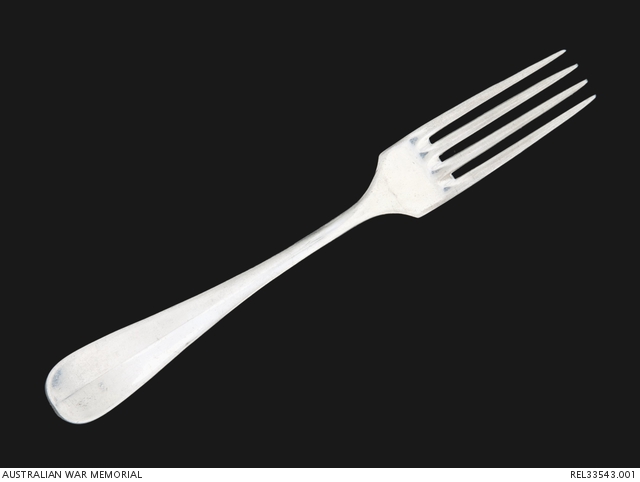| Places | |
|---|---|
| Accession Number | REL33543.001 |
| Collection type | Heraldry |
| Object type | Personal Equipment |
| Physical description | Aluminium |
| Maker |
LGK&F |
| Place made | Germany |
| Date made | 1941 |
| Conflict |
Second World War, 1939-1945 |
German fork : Private J G Kettle, 2/5 Australian General Hospital



German alloy fork issued to an Australian prisoner of war. The underside of the fork handle is impressed with a Nazi eagle and swastika, and with the maker's marking 'LGK&F 41'.
Light alloy fork used in captivity by NX21186 Private James Gerrard 'Jimmy' Kettle, of the 2/5th Australian General Hospital (2/5 AGH). Kettle was captured with most of the male staff of 2/5 AGH by the invading German forces at Athens, Greece, on 21 May 1941. 2/5 AGH stayed in Athens as a complete unit following its capture, and continued to operate as a hospital under German control until the end of 1941, when the remaining staff and patients were sent to Germany. Kettle, with most other members of his unit, was imprisoned at Stalag XXA, at Torun (or 'Thorn') in Poland.
In 1943, apparently in return for the continued operation of the hospital in Athens in 1941, almost all of the prisoners from 2/5 AGH, including Kettle, were repatriated to Australia. Only a few men who had been sent to other camps remained in Germany until the end of the war.
James Kettle was born in Liverpool, England, on 8 April 1909 and immigrated to Australia. He had previously served in the militia with 9 Field Ambulance, and was working as a bus conductor when he enlisted in the Second AIF, on 23 May 1940. 2/5 AGH arrived in Egypt at the end of November 1940. The hospital moved to Greece on 10 April 1941. Following the capture of the hospital, Kettle was assigned the German prisoner of war number, 26112. German authorities advised the Red Cross that Kettle arrived at Stalag XXA on 4 March 1942.
The members of 2/5 AGH from Stalag XXA were repatriated to Britain by sea on 28 November 1943. They returned to Australia aboard the troopship Watsonia, travelling via the United States to Brisbane. From Brisbane the former POWs travelled to Sydney by train. After leave the hospital was reformed and trained for service in the Pacific. Many of the former prisoners from Germany remained with the hospital, but in March 1943 Kettle's fitness for service was rated as Class B (constitutional) and he was deemed unfit for service outside Australia. In May 1944 he was discharged at his own request on compassionate grounds. Jimmy Kettle died at the Concord Repatriation hospital in Sydney in February 1948.
Related information
Conflicts
Subjects
Related Objects
- Autographed Australian flag : Prisoners of war captured in Greece, 2/5 Australian General Hospital
- Embroidered Australian coat of arms : Private J G Kettle, 2/5 Australian General Hospital
- Embroidered Nazi Badge : Private J G Kettle, 2/5 Australian General Hospital
- Rehabilitation work doll : Private J G Kettle, 2/5 Australian General Hospital, AIF
- Rehabilitation work doll : Private J G Kettle, 2/5 Australian General Hospital, AIF